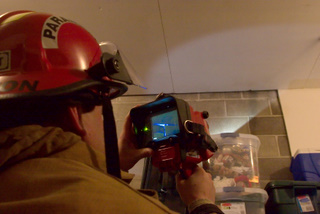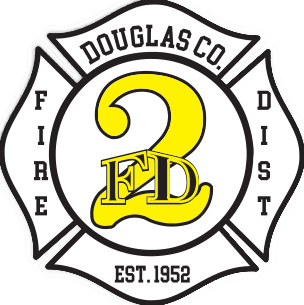Heating is one of the leading causes of home fires during the fall and winter months (October through February). Most reported home heating fires involve portable and fixed space heaters and their associated equipment, such as baseboard heaters, fire places, wood stoves, gas furnaces and chimneys.
 Douglas County Fire District No.2 fire fighters would like to encourage every one to keep their family safe and warm by taking just a few simple safety precautions that can prevent home heating fires from spreading beyond the equipment of origin and posing a serious threat of death and injury to household residents.
Douglas County Fire District No.2 fire fighters would like to encourage every one to keep their family safe and warm by taking just a few simple safety precautions that can prevent home heating fires from spreading beyond the equipment of origin and posing a serious threat of death and injury to household residents.
Baseboard Heaters
Baseboard heaters are very efficient, but they must be used with care. Common sense and good housekeeping can prevent most baseboard heater fires.
· Check baseboard heaters often and remove objects that have fallen on top or near the heater.
· Keep all furniture a safe distance from haters. Never block the flow of heat.
· Never permit electrical cords to drape across or on top of heaters.
· Always hire an experienced electrician to perform any necessary repair work on your baseboard heaters.
Portable Heaters
Portable heaters heat up rapidly, and like baseboard heaters, they can easily ignite any combustible item left nearby. When buying a portable heater, select a model with the following built in safety features:
· Temperature control.
· An automatic shut-off device.
· A seal of approval from an independent testing laboratory like Underwriter Laboratories (UL), indicating that it has met basic safety standards.
Safe operation of portable heaters must include the following:
· Keep portable heaters three (3) feet away from anything that can burn.
· Always place portable heaters of flat surfaces.
· Always turn the heater off when you leave the room or go to sleep.
· Avoid using household extension cords with portable heaters, if you must use an extension cord, make certain that it is a heavy-duty cord, and that you unplug it when you leave the room.
Fire Places and Woodstoves
If you use a fire place or woodstove to heat your home install them in accordance with the manufacturer’s instructions, and as required in applicable building and mechanical codes.
· Always use a fire screen to contain sparks and protect children and adults from burns or accidental clothing ignition.
· When burning fire wood in fire places and wood stoves, use well-seasoned wood that has been dried for at least six (6) months to a year and stored in a dry, well ventilated location.
· Never burn garbage in your fire place or woodstove.
· Make certain anything combustible is kept a safe distance from the fire place.
· Never leave a fire unattended, especially in areas used by children or pets.
· Clean out the fire place ashes when cool and dispose of them in a metal container.
Gas Furnaces
Gas furnaces provide efficient and clean heating in a large number of homes in most communities and require very little maintenance.
· Replace furnace filters as recommended by the manufacturer to ensure they operate efficiently.
· Have your furnace inspected and serviced annually by a professional to reduce the risk of carbon monoxide poisoning due to improper unit operation.
Chimneys
Chimneys are important equipment associated with fire places, woodstoves and gas furnaces.
· Chimney linings and smoke ducts should be adequate to withstand the temperatures given off by the fuels being burned in the fire place, wood stove or furnace they serve to prevent overheating of wall or roof materials.
· Have chimneys inspect and cleaned annually by a professional chimney sweep to reduce the risk of fires and carbon monoxide poisoning that could result from creosote build up obstructing the chimney.
· Keep the top of chimneys clear of tree limbs and other debris.
· Provide chimney caps to keep debris and animals out of the chimney.
Douglas County Fire District No.2 – Fire Prevention Division
(541) 673-5503; www.dcfd.org
